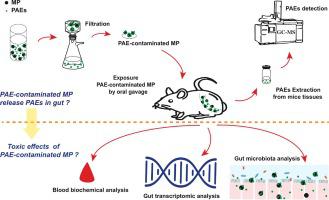Environment International ( IF 11.8 ) Pub Date : 2020-06-29 , DOI: 10.1016/j.envint.2020.105916 Yongfeng Deng 1 , Zehua Yan 1 , Ruqin Shen 1 , Meng Wang 2 , Yichao Huang 3 , Hongqiang Ren 1 , Yan Zhang 1 , Bernardo Lemos 2

|
Increasing evidence shows that microplastics (MPs) have the potential to act as carriers and transport contaminants into organisms, as well as induce serious health risks. Here we endeavored to address for the first time whether MPs could transport and release phthalate esters (PAEs) into mouse gut and the consequential toxic effects. As a result, MPs could adsorb PAEs, transport PAEs into the gut and cause intestinal accumulation. The accumulation of PAE in the gut followed the order of DEHP > DBP > DEP > DMP, which was the same order for the adsorption of PAEs on MPs. After exposed to DEHP-contaminated MPs for 30 days, significantly increased intestinal permeability and enhanced intestinal inflammation were induced compared with individual MPs and DEHP according to biochemical and histological analysis. Transcriptomic analysis found that 703 genes were differentially regulated and these genes are involved in oxidative stress, immune response, lipid metabolism, and hormone metabolism. Moreover, gut microbiota analysis found that the combined exposure of MPs and DEHP also caused alterations in gut microbiota composition, especially some energy metabolism and immune function related bacteria were significantly changed in the relative abundance. The aggravated effects on intestinal inflammation and metabolic disorders caused by DEHP-contaminated MPs may attribute to increased DEHP accumulation, changed exposure pathway, and shared toxic mechanisms. Our results provide valuable information for the health risk of MPs and plastic additives.
中文翻译:

微塑料释放邻苯二甲酸酯,并在小鼠肠道内引起严重的不良影响。
越来越多的证据表明,微塑料(MPs)有潜力充当载体并将污染物运输到生物体内,并带来严重的健康风险。在这里,我们首次尝试解决MP能否将邻苯二甲酸酯(PAE)转运并释放到小鼠肠道中以及随之而来的毒性作用。结果,MP可能吸附PAE,将PAE转运到肠道并引起肠道积聚。肠道中PAE的积累遵循DEHP> DBP> DEP> DMP的顺序,这与PAE在MP上的吸附顺序相同。根据生化和组织学分析,暴露于DEHP污染的MPs 30天后,与单个MPs和DEHP相比,可显着提高肠道通透性并增强肠道炎症。转录组分析发现703个基因受到差异调节,这些基因与氧化应激,免疫反应,脂质代谢和激素代谢有关。此外,肠道菌群分析发现MPs和DEHP的联合暴露也引起肠道菌群组成的改变,特别是一些能量代谢和免疫功能相关细菌的相对丰度发生了显着变化。由DEHP污染的MP引起的肠道炎症和代谢紊乱的加剧影响可能归因于DEHP积累的增加,暴露途径的改变以及共同的毒性机制。我们的结果为MP和塑料添加剂的健康风险提供了有价值的信息。脂质代谢和激素代谢。此外,肠道菌群分析发现MPs和DEHP的联合暴露也引起肠道菌群组成的改变,特别是一些能量代谢和免疫功能相关细菌的相对丰度发生了显着变化。由DEHP污染的MP引起的肠道炎症和代谢紊乱的加剧影响可能归因于DEHP积累的增加,暴露途径的改变以及共同的毒性机制。我们的结果为MP和塑料添加剂的健康风险提供了有价值的信息。脂质代谢和激素代谢。此外,肠道菌群分析发现MPs和DEHP的联合暴露也引起肠道菌群组成的改变,特别是一些能量代谢和免疫功能相关细菌的相对丰度发生了显着变化。由DEHP污染的MP引起的肠道炎症和代谢紊乱的加剧影响可能归因于DEHP积累的增加,暴露途径的改变以及共同的毒性机制。我们的结果为MP和塑料添加剂的健康风险提供了有价值的信息。特别是一些能量代谢和免疫功能相关细菌的相对丰度发生了明显变化。由DEHP污染的MP引起的肠道炎症和代谢紊乱的加剧影响可能归因于DEHP积累的增加,暴露途径的改变以及共同的毒性机制。我们的结果为MP和塑料添加剂的健康风险提供了有价值的信息。特别是一些能量代谢和免疫功能相关细菌的相对丰度发生了明显变化。由DEHP污染的MP引起的肠道炎症和代谢紊乱的加剧影响可能归因于DEHP积累的增加,暴露途径的改变以及共同的毒性机制。我们的结果为MP和塑料添加剂的健康风险提供了有价值的信息。


























 京公网安备 11010802027423号
京公网安备 11010802027423号